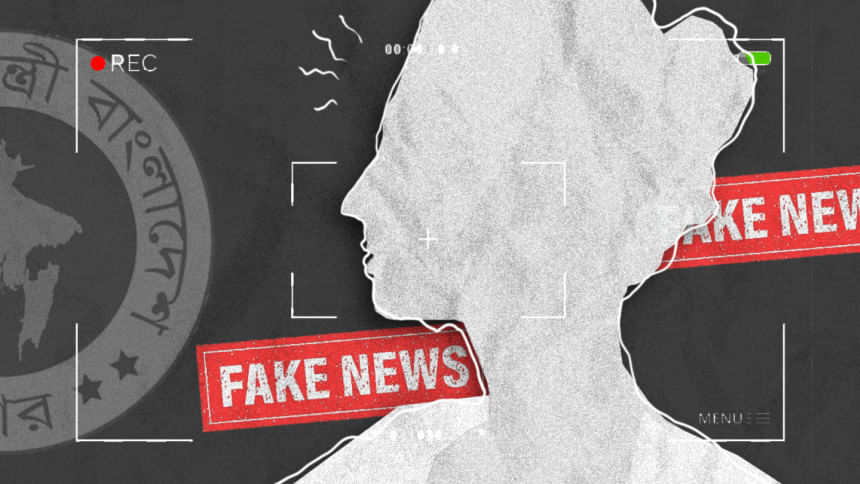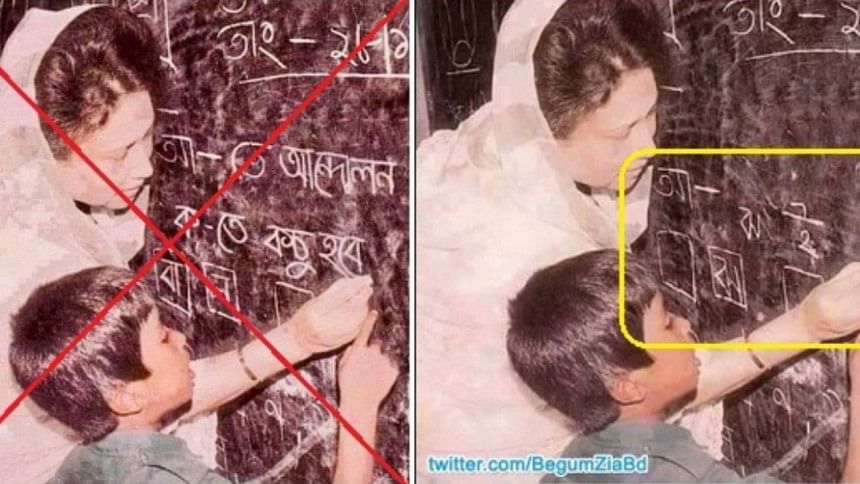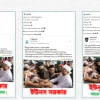Women and politics in the disinformation era

In November 2023, an online video showed Prime Minister Sheikh Hasina in Medina, Saudi Arabia, being greeted with slogans of "Bhua, bhua." The original footage of the prime minister's Medina visit had no such sounds in the background, and the audio was found to have been added from a different, unrelated incident. In October 2023, a picture of BNP Chairperson Khaleda Zia showing a child through the letters of the Bangla alphabet that "movements were useless" (in the context of the BNP's movement against the national elections) made the rounds on social media. The original photograph, from 1993, was of Khaleda's visit to a school where she was teaching a child the alphabet. Nobel laureate Prof Muhammad Yunus posing with scantily clad women and perusing through a Playboy magazine. Caricatures of BNP leader Mirza Fakhrul Islam Alamgir dressed in a blouse, necklace, and bangles. BNP politician Rumeen Farhana sporting a bathing suit in the middle of the sea. A photo card with the logo of a national daily claiming that the wife of Zonayed Saki, chief coordinator of Ganosamhati Andolan, had filed for divorce because of domestic violence. A photograph gone viral of actor and debut politician Mahiya Mahi holding hands with former MP Murad Hasan. An image of Gono Odhikar Parishad leader Nurul Haque Nur with BNP politician Shama Obaid with a caption claiming that she was the love of his life…

Fake news. Image manipulation. False identity attribution. The methods of disinformation—fake news or fabricated content with the intention to deceive—are ever sophisticated and seemingly endless in this age of advanced technologies and artificial intelligence.
News in general reflects a masculine agenda, pushing news relevant to women to the margins and "othering" the feminine. Gender and media scholar Karen Ross has shown how political news in particular undermines women's role in politics through trivialisation, marginalisation and commodification of women. Research across the globe on women in politics and the media shows that media representations of women leaders and politicians reflect widely circulated gender norms and assumptions, focusing on "soft" news such as health and education as women's areas, on the personal lives of women politicians (marriage, motherhood, family life, etc), and on style over substance (what men say, believe, do; how women look, talk, feel). This process of "gendered mediation"—defined by political scientist Linda Trimble as the ways in which processes and products of news-making reflect gender norms, binaries and power relations—reinforces the masculinity-femininity binary in media discourses, focusing on, reflecting and reinforcing stereotypes.

This "symbolic annihilation" of women, as coined by sociologist Gaye Tuchman in the 1970s, has only increased, showing politics as a male activity, portraying women as extraordinary and as outsiders in the political arena, and its breach by women as inappropriate. Research on the media coverage of women politicians in the 2018 election in Bangladesh, for example, showed how women were depicted as women first and politicians later, highlighted in relation to their male mentors or relationships with men. Female candidates were shown as new, inexperienced and incompetent, as strategic nominees for female voters, or as standing out simply because they were women, for reasons other than their political work.
These discriminatory trends are also reflected, and multiplied manifold times, in the era of fake news and disinformation. While disinformation is increasingly shaping political processes on not only a national but a global scale, according to the Inter-Parliamentary Union, a growing number of disinformation campaigns target women in politics, spreading false, inaccurate or misleading gendered and sexualised narratives against them. Some visual disinformation strategies, such as deepfakes, target women disproportionately. Research has found several such strategies of visual misogyny and "technology-facilitated sexual violence," "image-based sexual abuse" and "image-based harassment," including "photoshop harassment," "meme images harassment," and "rape drawings," among others. "Political pornification" capitalises on women's bodies, and is aimed at discrediting, objectifying and dehumanising women in politics much more than it is at men.
A study by the National Democratic Institute on state-aligned gendered disinformation online found that online spaces are systematically weaponised, depicting women as devious, stupid, overly sexual, in need of protection or immoral. Through the use of hateful language, rumour and gendered stereotypes combining personal attacks with political motivations, these discourses portray women as unfit for public life.
As with negative media coverage of women politicians, disinformation campaigns not only influence public perceptions of women in politics, but also discourage women from pursuing political careers and leadership roles. They further reinforce the discourse of politics as a male domain and women as outsiders.
While the first two examples above of the country's top women politicians being subjected to disinformation may not be gendered as such, the common thread running through each example is "woman." In the very first year of journalism at university, students are taught that "women" and "sex" are important news factors. The same goes for disinformation. A woman's photograph, altered or not; a woman's personal life, relevant or not; a woman accompanying a man, genuinely or photoshopped—these are some of the most common and most popular ways to make disinformation go viral. Women are not only seen as the "other," but also used in association with the "other" in order to reinforce the latter's image as the opposition, as the enemy.
Critical discourse studies scholar Eleonora Esposito's research on online gendered and sexualised disinformation against women in politics concludes that people believe in misogynous rumours about women in politics (and also women generally) because they want to, based on their preconceived notions about women which are grounded in traditional gendered hierarchies, a long-standing obsession with women's (sexual) morality, and mediatised sexism. As such, until these deeply-embedded preconceived notions and gender hierarchies are challenged and removed, women will continue to be at the receiving end of misogynistic discourses in both the real world and the media, offline and online.
The study by the National Democratic Institute warned that, left unchecked, gendered disinformation poses a serious threat to women's equal political participation. The media is responsible for equal treatment of women and men, familiarising people with the image of women politicians, demonstrating that they are not exceptions but, increasingly, the norm in politics, and for encouraging the involvement of an even greater number of women in the political process. In addition, in this era of technology and mis/disinformation, state and non-state actors and the public at large must not only employ fact-checking methods and tools, but also need to practise media literacy, gender sensitivity and common sense in countering disinformation campaigns in general, and those against women and female politicians in particular, towards establishing a gender-balanced political system.
Kajalie Shehreen Islam is associate professor at the University of Dhaka.
Views expressed in this article are the author's own.
Follow The Daily Star Opinion on Facebook for the latest opinions, commentaries and analyses by experts and professionals. To contribute your article or letter to The Daily Star Opinion, see our guidelines for submission.

 For all latest news, follow The Daily Star's Google News channel.
For all latest news, follow The Daily Star's Google News channel. 











Comments